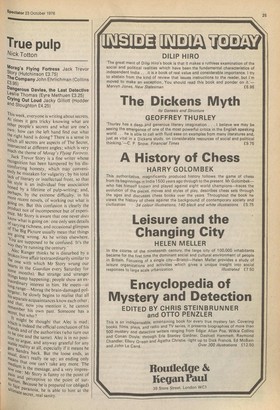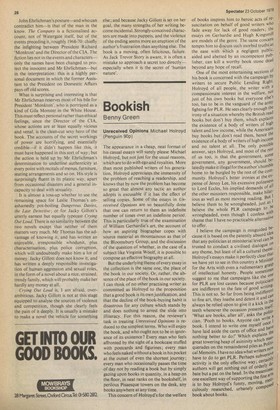True pulp
Nick Totton
Morag's Flying Fortress Jack Trevor Story (Hutchinson £3.75) The Company John Ehrlichman (Collins 23.95)
Dangerous Davies, the Last Detective Leslie Thomas (Eyre Methuen 0.25) Crying Out Loud Jacky Gillott (Hodder and Stoughton £4.25) This week, everyone is writing about secrets. At times it gets tricky knowing what are Other people's secrets and what are one s Own: how can the left hand find out what the right hand is doing? There is a sense in Which all secrets are aspects of The Secret, intersected at different angles; which is very much the theme of Morag's Flying Fortress. Jack Trevor Story is a fine writer whose recognon has been hampered by his dis
comforting honesty, which may conveni
ently be mistaken for vulgarity; by his total lack of literary or intellectual front, so that
,his style is an individual free association honed by a lifetime of pulp-writing; and, Perhaps, by the extreme difficulty, in his
more recent novels, of working out what is g°ing on. But this confusion is clearly the Product not of incompetence but of experience. Mr Story is aware that one never does know What is going on : one only sees details of varying richness, and occasional glimpses °f The Big Picture usually mean that things are going wmng. As he writes elsewhere, s Ton are supposed to be confused. It's the Way they're running the century.'
Alec Ranger thinks he is disturbed by a i°roken love affair (extraordinarily similar to
one with which Mr Story wrung our hearts in the Guardion every Saturday for Some rne months). But strange and stranger keep happening; people show an exirui 4ordinary interest in him. He meets—at tOng range--Morag the brain-damaged pol eh.rgeist: he slowly begins to realise that all a's seParate acquaintances know each other: rend that, now you mention it, he cannot „".nlember his own past. Someone has a
cret, but who')
1 might be thought that Alec is mad: wi, la is indeed the official conclusion of his torlebncls and of the authorities (who turn out tio! One and the same). Alec is in nopo5iMau10 argue, and anyway grateful for any bl ge ec,reality at all, especially if it means he ust, ." Sand back. But the loose ends, as nieu_711, don't really tie up; an ending only rner.s that one can't take any more. The sivetullin is the message, and a very impres pain°°e: Mr Story is funny to the point of reali and Perceptive to the point of surto f„stn• Because he is prepared (or obliged)
t 'Lee Paranoia, he is able to hint at the "'ate secret, real sanity. John Ehrlichman's posture—and who can contradict him—is that of the man in the know. The Company is a fictionalised ac count, not of Watergate itself, but of the events preceding it, roughly 1968-70: chiefly the infighting between President Richard 'Monkton' and the Director of the CIA. The fiction lies not in the events and characters.— only the names have been changed to protect the innocent and Mr Ehrlichman—but in the interpretation: this is a highly personal document in which the former Assistant to the President on Domestic Affairs pays off old scores.
What is surprising and interesting is that Mr Ehrlichman reserves most of his bile for President 'Monkton', who is portrayed as a kind of Gila Monster in the White House. This must reflect personal rather than ethical feelings, since the Director of the CIA, whose actions are at least equally vicious and venal, is the clean-cut sexy hero of the book. The accounts of the secret workings of power are horrifying, and essentially credible—if it didn't happen like this, it must have happened in this sort of way; but the action is held up by Mr Ehrlichman's determination to underline authenticity at every point with recitals of menus, furniture, seating arrangements and so on. His style is surprisingly fluent in its plastic way, apart from occasional disasters and a general incapacity to deal with sexuality.
It is almost a toss-up whether to use the remaining space for Leslie Thomas's unashamedly pot-boiling Dangerous Davies, the Last Detective; or for Jacky Gillott's utterly earnest but equally typecast Crying Out Loud. There is no similarity between the two novels except that neither of them matters very much. Mr Thomas has the advantage of knowing it, and has written an enjoyable, irresponsible whodunit, plus characterisation, plus police corruption, which will undoubtedly make him a lot of money. Jacky Gillott does not know it, and has written a deeply responsible investigation of human aggression and sexual roles, in the form of a novel about a nice, strained, trendy family, which will probably make her hardly any money at all.
Crying Out Loud is, I am afraid, overambitious. Jacky Gillott is not at this stage equipped to analyse the sources of violence and competition, though she clearly feels the pain of it deeply. It is usually a mistake to make a novel the vehicle for something else; and because Jacky Gillott is set on her goal, the many strengths of her writing become incidental. Strongly-conceived characters are made into puppets, and the violence of the ending seems more an eruption of the author's frustration than anything else. The book is a moving, often felicitous, failure. As Jack Trevor Story is aware, it is often a mistake to approach a secret too directly— especially when it is the secret of 'human nature'.











































 Previous page
Previous page